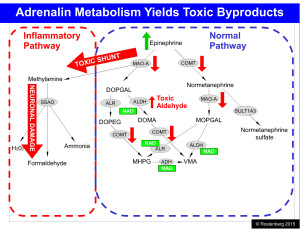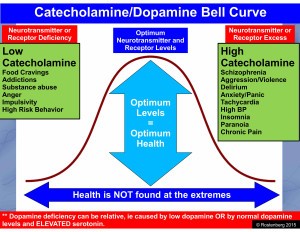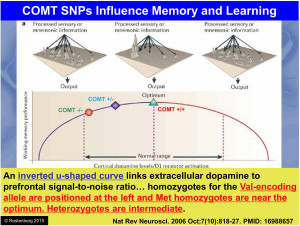Everyone has felt the negative effects of stress in their lives, yet not everyone responds to stress in the same way. While our life experience has a great deal of influence on our perception of stress, certain genes make us more or less sensitive to stress. One big reason why stress affects each of us differently has to do with how well our bodies can detoxify catecholamines – the chemicals of stress. As you will soon come to learn, our methylation cycle has a huge influence on well we detoxify catecholamines. What this article will show you is how an important gene, the COMT gene, controls how the brain reacts to stress.
Specifically, we are going to look at the COMT gene and how it influences our brain function on a daily basis. This will give you the background necessary to understand why and how stress can change our brain. Because the COMT system is involved in the metabolism and detoxification of stress hormones, it has a major influence on how we deal with stress. Therefore anything that interferes with the function of COMT (and MAO) will make you more sensitive to the effects of stress!
*NOTE: For simplicity’s sake I am going to use the terms catecholamines, dopamine, adrenalin, and norepinephrine interchangeably. These terms all relate to the same hormones/neurotransmitters released by our body when under stress. If you wish to perform further research on your own, you will find that there are differences between these chemicals – but today I am lumping them all together for ease of teaching and understanding.
When we experience stress, many people rally to the cause and increase their performance. Yet others seems to melt and fall apart under the same type of pressure. How can two different people under going the same type of stress have such different experiences? The answer lies in understanding how the COMT system influences the brain.
 Figure 1 COMT and MAO Neurotransmitter Pathway
Figure 1 COMT and MAO Neurotransmitter Pathway
You can see in Figure 1 the complex pathway involved in detoxifying stress hormones. You can also see that the COMT and MAO enzymes are major players in the removal of stress hormones and neurotransmitters. Also sex hormones and chemical toxins also interfere with this pathway, making our brains even more susceptible to catecholamine-related illness.
COMT – A Common Problem
The first thing to realize is that COMT gene polymorphisms are VERY common. In fact, we now know that 80% of the population has a SNP in the COMT V158M gene – the COMT gene which science knows the most about. A 2015 study published in Sleep Medicine Reviews highlights the fact that that 30% of people are homozygous (+/+) and 50% are heterozygous (+/-) for the COMT V158M allele. Amazingly, the same research article also revealed that the COMT V158M polymorphism slows down the COMT system by 300%! And if you slow something down in your body by 300% you don’t have to have a PhD to know it can impact your health.
Since the vast majority of people alive today have genetic imbalances in their stress metabolism pathway, we have to ask a few questions:
- If 80% of everyone you see walking down the street has a COMT gene imbalance, wouldn’t you expect that 80% of people would have stress-mess symptoms which come from a slowed COMT pathway?
- Wouldn’t it make sense that if 80% of the population have a slowed COMT pathway that stress would cause the same symptoms in each person?
- Don’t genes control your destiny? For example if you have alterations in the way your body detoxifies stress hormones then are you not destined to be a super stress-mess?
The answer to all these questions is a resounding NO!
Remember this: your genes are NOT your destiny but they are your TENDENCY! I love educating patients that just because you have a gene for something doesn’t mean it will be a problem. In fact, the environment inside the body is many times more important than the genes you have. Yet we cannot ignore that certain genes do influence how we feel. And without a doubt the COMT gene has a massive influence on how we feel on a day-to-day basis in our modern, toxic, stressed-out world!
COMT and the Catecholamine Bell Curve
The COMT system helps to break down dopamine, norepinephrine and epinephrine – neurotransmitters and hormones our body releases when it is under stress. The brain is a lot like the Goldilocks and the Three Bears story – it wants just the right amount of stress, not too little and not too much. In other words, the brain functions on a bell curve of activity with dysfunction on either end and optimum function in the middle. Figure 2 below illustrates this point clearly:
 Dopamine Imbalance in the Brain Comes in Two Distinct Flavors:
Dopamine Imbalance in the Brain Comes in Two Distinct Flavors:
- LOW DOPAMINE or CATECHOLAMINES – Left side of bell curve where dopamine is low; causes depression of the frontal lobe, neuronal circuits slow down, and the neocortex cannot function at normal speed. Symptoms include:
- Cravings
- Substance Abuse
- Addictions
- Anger
- Impulsivity
- High Risk Behavior
- HIGH DOPAMINE or CATECHOLAMINES – Right side of bell curve where there is excess dopamine; causes over-stimulation of the frontal lobe, neuronal circuits fatigue and become overstimulated, and the neocortex cannot function at normal speed. Symptoms include:
- Anxiety
- Chronic Pain
- Worry
- Delirium
- Tachycardia
- High Blood Pressure
- Insomnia
- Paranoia
- Schizophrenia/Psychosis
*It is my clinical opinion that individuals who experience “overmethylation” symptoms are actually feeling the side effects of excess catecholamines.
When the level of dopamine in the frontal lobe is balanced and optimized, your brain is working at its best. In contrast, if dopamine levels in the frontal lobe fall too low you become depressed; if they increase too much you become anxious, worrisome and have difficulty with memory and brain fog. Its fair to say that the symptoms many people are suffering with on a daily basis are due to imbalanced dopamine levels. These catecholamines are so powerful that when they are out of balance, we are out of balance!
The Advantages of Higher Dopamine Levels
Higher dopamine isn’t always a bad thing like the list above would suggest. Remember, when individuals are born with a SNP in the COMT gene (esp. the V158M COMT) they are born with a SLOWER COMT enzyme. This predisposes them to having MORE DOPAMINE in the frontal lobe of the brain. Under less stressful circumstances, these individuals are proven to have better memory and more brain function – basically they are very smart people!
Remember that more dopamine in the frontal lobe of the brain confers an ADVANTAGE in less-stressful periods. With more dopamine (and norepinephrine and epinephrine) these individuals have a very alert mind, better memory and will be quick, sharp learners. With higher dopamine levels the brain becomes more active, receives more nutrients and builds a strong neurological network. But this advantage of having higher dopamine from a slower COMT system also carries with it a disadvantage. When life becomes overly stressful these individuals will LOSE BRAIN FUNCTION as the level of catecholamines in the brain increases and falls off the right side of the curve.
Understanding the Dopamine Curve
While having COMT SNPs can increase your focus and learning, it becomes a liability under high stress conditions since it causes dopamine to build up to toxic levels. Take a closer look at Figure 3 below. You will see that there are three shapes placed along the curved line: COMT -/-, COMT +/- and COMT +/+. These mark the different levels of frontal lobe dopamine you will find in individuals with different COMT genes:
 COMT Genes Influence How Much Dopamine is in Your Brain:
COMT Genes Influence How Much Dopamine is in Your Brain:
- COMT V158M -/- – These individuals have a quicker COMT system, therefore they have lower levels of dopamine at a steady, resting state. They can handle multiple stressors at a single time better than the -/+ or +/+.
- COMT V158M +/- – These individuals live in the middle between a fast and slow COMT. Compared to the -/- group, they have a slowed COMT system, therefore they have slightly higher levels of dopamine at a steady, resting state. They can handle less stress than the COMT -/- but more than the COMT +/+.
- COMT V158M +/+ – These individuals have the slowest COMT system, therefore they have the highest levels of dopamine at a steady, resting state. They are going to have higher performance and more brain function in low stress states, but will lose brain function as the number of stressors increases.
Remember when I said that brain function is a bell curve with dysfunction on either end? Well when people with COMT genes become overly stressed they end up with TOO MUCH DOPAMINE in their frontal lobe. This excess catecholamine activity pushes the individual off to the right-hand side of the curve, interfering with output of the frontal lobe. This causes a DECREASE in brain function as you can see in Figure 3 above. Excess dopamine/catecholamine activity in the frontal lobe predisposes individuals to burning out, insomnia, pain, anxiety, worry and in severe cases schizophrenia and psychosis.
Basically when the body gets excessively stressed out, the COMT system cannot get rid of the adrenalin/dopamine/catecholamines fast enough. As I’ve shown above, this makes the brain sick with too many toxic, inflammatory stress hormones. When all those stress hormones are finished firing neurons they must be detoxified. This means the COMT enzyme will fall behind and not be able to detoxify these hormones fast enough. This is why all things being equal, the COMT +/+ gene predisposes us towards a phenotype of stress-induced illness.
Also as the frontal lobe and neocortex become saturated with catecholamines, esp. dopamine, it tries to protect itself from these potent chemicals by ignoring the signal. Just like when our insulin is too high we can get insulin resistance, we can actually develop a kind of dopamine resistance. The body ignores constant stimuli so it will do its best ignore the excess dopamine and catecholamines. The end result is a constant roller coaster of fatigue, lack of focus, and brain fog that makes getting through the day a challenging proposition.
COMT Dysfunction and Emotions
Emotional issues and imbalances are also very common in individuals with COMT SNPs. When the brain becomes less functional – either from stress, toxins, traumatic brain injury, etc. – then you will see a loss of control of emotions. When the brain is healthy it acts like a baby sitter keeping our subconscious emotions and fears at bay. Without the neocortex and frontal lobe working well, our subconscious impusles can errupt and disrupt behavior.
These emotional urges live in what is called the limbic system. When the neocortex and frontal lobe is healthy it keeps the limbic system in a calm, resting state. However, when the neocortex isn’t working well, the deeper emotional and fear-based programing in our limbic system begin to show up. These deeper emotional impulses may show up as anxiety, fear, worry, OCD behaviors, ADD, ADHD, and a host of other brain-based concerns.
You may know someone who has suffered a severe head injury and noticed their personality changed almost overnight. Head injuries damage the neocortex and the frontal lobe of the brain, which makes the brain unable to control the urges and deeper emotional patterns from the limbic system. This is the same principal we see with COMT gene SNPs. Excess catecholamines can cause loss of frontal lobe function and lead to lack of self-control, OCD, ADD, and impulsive behaviors. When you give children sugar and see their behavior degenerate and lose self-control, you are watching the frontal lobe become overstimulated and dsyfunctional. And the same thing can happen in people with slow COMT genes when they get too much dopamine inside their frontal lobe.
The brain really doesn’t want EXTRA dopamine, just like the Goldilocks character who doesn’t want the hot or cold porridge. The brain, like Goldilocks, wants the level of dopamine to be in the middle, the sweet spot where brain function is optimized.
Dietary and Nutritional Support for COMT Issues
For diet and supplement advice, please visit my COMT & MAO Brain Support protocol page for ideas regarding diet and supplements for COMT and MAO-related issues.
Conclusion
Clearly the subject of stress is a powerful one that impacts all of our lives. Some people react to stress in a much more negative manner than other people in the same situation. These differences in how we respond to stress have a lot to do with how we process stress hormones. And this has a lot to do with the COMT gene – depending on if it is going faster or slower. This is a critical part of the methylation cycle that goes beyond just looking at MTHFR.
But just because a gene is present in the body does not mean it will lead to a disease or dysfunction. The truth we share with all our patients is that genes are NOT your destiny, but they ARE your TENDENCY! In other words, the genes you inherit depend on environmental signals inside and outside the body to control their function. And by following the principals of natural health you can change the environment.
Optimizing genes and changing lives is the big idea that drives our work at BeyondMTHFR and with patients in our clinic in Boise. This article shows how COMT is a powerful player in how we respond to and react to stress. I have shared with you how our brain function is dependent upon levels of dopamine. Now its clear what the COMT gene does and how common it is in our society. And you can now see that TOO MUCH DOPAMINE is as big (or bigger) of a problem than TOO LITTLE DOPAMINE.
For more videos and learning about COMT, MAO and Methylation I recommend:
How Blood Sugar Influences Dopamine/Adrenalin Levels – COMT and MAO
A Genetic Cause of Pain and Anxiety – COMT, MAO and MTHFR
Adrenal Fatigue – The 7 Signs of Adrenal Stress
In Health,
Dr. Rostenberg
PS – Stay tuned for the following two videos where I will highlight how hormone imbalance and toxins from our environment can change the COMT and MAO system. You will learn how hormones and toxins can interfere with our brain function. I will also share with you the natural healing protocols to improve your brain’s environment and reduce the effects of stress!
By studying the current peer-reviewed research, Dr. Rostenberg has discovered powerful, natural strategies to optimize brain function and heal your body. Using his knowledge of methylation and optimum health, he has helped patients from all over the world overcome their genetic imbalances. He can help you uncover the genetic or root causes of your health problem and find a natural solution! If you would like help with optimizing your genes to improve your methylation and reduce/eliminate your symptoms, please contact Dr. Rostenberg at Red Mountain Natural Medicine today. Phone 208-322-7755. Email redmountainclinic@gmail.com. Website https://www.redmountainclinic.com




